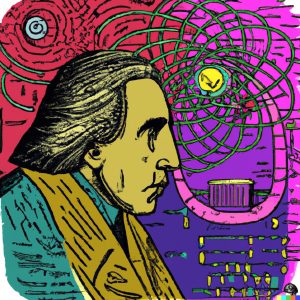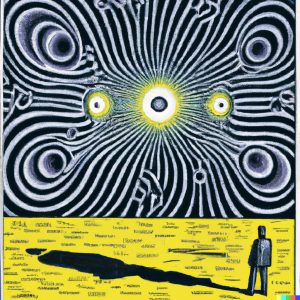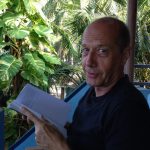Fear, Freedom and the Queer World of Quantum Mechanics
featured image | David Manlove
Traditionally, for many hundreds of years, religion was the source of ethics, the unquestioned authority on how to live and act. In the secular West today, in case you hadn’t noticed, this is no longer the case. The burden of meaning-making is now firmly on our own shoulders. The primary reasons for this are the triumph of science and the development of the individual.
Although brought up in a loosely traditional Christian family in which we would all dutifully troop off to church on a Sunday, when I was a teenager, I rebelled against any external authority that might tell me how I should live my life. I delighted in the freedom of making my own choices—the essential individual! But it wasn’t long before I was looking for some form of meaning and guidance in a world I felt completely alienated from, albeit an approach that made sense to me. At nineteen I found my way to the Indian philosopher J. Krishnamurti, and a book written specifically for young people. He wrote:
Is it not possible for all of us, while we are young, to be in an environment where there is no fear but rather an atmosphere of freedom, not just to do what we like, but to understand the whole process of living? Life is really very beautiful, it is not this ugly thing that we have made of it; and you can appreciate its richness, its depth, its extraordinary loveliness only when you revolt against everything – against organised religion, against tradition, against the present rotten society – so that you as a human being find out for yourself what is true.
Looked at this way, it could be said that meaning and ethics are quite natural to a human being when brought up in an atmosphere without fear, and with a freedom that nurtures human enquiry. But unfortunately, most of us don’t have this opportunity or the privilege such a possibility might entail. And education unfortunately, is primarily aimed at enabling us to fit into the system; a cultural substructure still enclosed within a Cartesian form of knowledge, predicated on the idea of the individuals’ distinct separateness from the world. This leaves us as individuals unmoored at the level of being from any relational context for our lives, grasping for meaning in a world of representational abstraction.
Edmund Husserl wrote in The Crisis of European Sciences:
We must note something of the highest importance that occurred even as early as Galileo: the surreptitious substitution of the mathematically substructed world of idealities for the only real world, the one that is actually given through perception, that is ever experienced and experienceable…our everyday life-world.
Individualism Challenged
The rise of the individual has been critical since Nietzsche and indeed still is, in enabling us to move beyond a traditional world governed by religion, belief, and authoritarianism. This has given us an unprecedented degree of freedom and capacity for authenticity, bringing with it essential human rights and liberal forms of social justice. But individualism as a ‘theology’ has also hollowed out the world, depriving us of a deeper meaning for being alive, leaving us to some extent alone in a hall of subjectivist mirrors.
In Western progressive thinking and in the new science, an understanding is developing that points directly to the potential restoration of a natural ethics. This is one in which life is understood as an interrelationship, or perhaps more accurately as the physicist and post-humanist philosopher Karen Barad suggests, an “intra-relationship”. According to Barad, the genius of quantum physics, Niels Bohr’s work on quantum theory in the early twentieth century, elicited a breakthrough that revolutionized the classical physics of Isaac Newton, as well as undoing the foundations of Western epistemology. In essence: “We are part of that nature that we seek to understand.” (Barad)
 As Barad elaborates in her book, an exposition of Bohr’s quantum philosophy-physics, Meeting the Universe Halfway, “the neologism “intra-action” signifies the mutual constitution of entangled agencies. That is, in contrast to the usual “interaction,” which assumes that there are separate individual agencies that precede their interaction, the notion of intra-action recognizes that distinct agencies do not precede, but rather emerge through, their intra-action. It is important to note that the “distinct” agencies are only distinct in a relational, not an absolute, sense, that is, agencies are only distinct in relation to their mutual entanglement; they don’t exist as individual elements.”
As Barad elaborates in her book, an exposition of Bohr’s quantum philosophy-physics, Meeting the Universe Halfway, “the neologism “intra-action” signifies the mutual constitution of entangled agencies. That is, in contrast to the usual “interaction,” which assumes that there are separate individual agencies that precede their interaction, the notion of intra-action recognizes that distinct agencies do not precede, but rather emerge through, their intra-action. It is important to note that the “distinct” agencies are only distinct in a relational, not an absolute, sense, that is, agencies are only distinct in relation to their mutual entanglement; they don’t exist as individual elements.”
The ”Metaphysics of Individualism”
Let’s back up for a moment. The core of Niels Bohr’s discovery in his experiments was that the behavior of electrons, as either waves or particles, would change (they would sometimes behave as waves and sometimes as particles), according to how the scientific apparatus was used. This ran completely contrary to classical Newtonian physics which presumed that an electron was determinate as either a wave or a particle, independent of human intervention. As a result of these experiments, Bohr concluded that, “our ability to understand the world hinges on our taking account of the fact that our knowledge making practices are social-material enactments that contribute to, and are a part of, the phenomena we describe.” (Barad)
For Barad, Bohr’s philosophy-physics poses “a radical challenge not only to Newtonian physics but also to Cartesian epistemology” on which it is based. She considers Bohr to call into question several tenets of Newtonian physics: representationalism, the fundamental taken-for-granted distinction between representations and what they proport to represent; what Barad calls (and I love this), “the metaphysics of individualism” i.e., that the world consists of individual and separate entities; and finally, the “intrinsic separability of the knower and known.” Barad considers the implications of the lack of separation between knower and known, subject and object in Bohr’s theory, to be not just epistemic but ontological. This means it has implications on the level of being.
Barad makes the point however, that Bohr kept his focus entirely on the epistemological conclusions of his work and did not, unfortunately, attempt to deliberate on its ontological implications about the nature of reality itself. What Barad attempts to do in her book, through the theory of what she calls “agential realism”, is to establish a new epistemology, ontology, and ethics.
Agential Realism: Knowing Versus Representing
In Barad’s agential realist elaboration, knowing does not come from representing the world, but from direct engagement with it. “We don’t obtain knowledge by standing outside the world; we know because we are of the world.” For Barad, à la Bohr, knowing and being are mutually entangled, as are matter and meaning. Matter is not fixed but is agentic and intra-active…Matter’s dynamism is generative, not merely in the sense of bringing new things into the world, but in the sense of engaging in an ongoing reconfiguration of the world.” This is pointedly a posthuman conception, one in which the human being is no longer at the centre; one which questions where agency itself is localized.
The implications of Bohr’s quantum theory points directly to the fact that science cannot be separated from ethics, and this emphasis is at the heart of Barad’s thesis. In her words, “Realism, then, is not about representations of an independent reality but about the real consequences, interventions, creative possibilities and responsibilities of intra-acting within and as part of the world.”
And yet…without in any way diminishing the awe-inspiring revelations of Bohr’s quantum theory and the contribution of Barad’s brilliant elaboration, the question remains, are we mature enough as a species to consider its radical implications? So far, it appears not. It is impossible it seems, to underestimate the extent to which we are addicted to our role as mere observers of the world, where we remain safe to perpetuate our instrumental, rationalist interventions on each other and on a desperate planet. As it is, ironically, the roots of quantum mechanics will be forever historically intertwined, as Barad herself acknowledges, with the spectre of the creation of the atomic bomb. And our caution about the exponential risks of the rapid advances in AI and nanotechnology always seems to lag behind the innovatory thrill and potential profitability, they offer us. Right now, we can see the extent to which even classical environmental science is being ignored in the seemingly death-seeking reaction of governments and fossil-fuel industries to the climate and ecological catastrophe.
And yet…we are intertwined with all of this. We cannot escape any of it. Therein lies the responsibility. To what extent are we able to understand and deconstruct our own binary gaze on the world? It takes so much to question our own perceptions, especially those we have inherited from our cultural theology.
Meanwhile implicit within Bohr’s quantum revelations there remain profound questions about the nature of identity, causality, time, and space that may yet reveal further dimensions of the potential of the posthuman, and our intra-relationship with the lifeworld.
Magical Thinking?
 To this end, there has been much lambasting from within metamodernism about the so-called, “magical thinking” of New Age spirituality, and with good reason. But what exactly do we mean by magical thinking? Is it anything that doesn’t conform to classical science? I think we can all agree we need a much richer account of what it means to be human than the one we have now. I raise this question partly as a result of my personal experience. While exploring the relationship between consciousness and culture in a spiritual collective grounded in years of serious spiritual practice, some very ‘strange’ things occurred. We experienced many times what I can only categorize as quantum non-locality, where breakthroughs in individual and collective consciousness in one part of the world, were shortly after re-produced spontaneously in another part of the world. “Distance loses its objectivity—its edge—to pressing questions of boundary and connectivity”. (Barad) But this was not the connectivity of technology that Barad is referring to here, but of consciousness itself!
To this end, there has been much lambasting from within metamodernism about the so-called, “magical thinking” of New Age spirituality, and with good reason. But what exactly do we mean by magical thinking? Is it anything that doesn’t conform to classical science? I think we can all agree we need a much richer account of what it means to be human than the one we have now. I raise this question partly as a result of my personal experience. While exploring the relationship between consciousness and culture in a spiritual collective grounded in years of serious spiritual practice, some very ‘strange’ things occurred. We experienced many times what I can only categorize as quantum non-locality, where breakthroughs in individual and collective consciousness in one part of the world, were shortly after re-produced spontaneously in another part of the world. “Distance loses its objectivity—its edge—to pressing questions of boundary and connectivity”. (Barad) But this was not the connectivity of technology that Barad is referring to here, but of consciousness itself!
Then there is the question of the quantum relationship to time. As Barad comments in her book, the past is not over, we never leave it, and it never leaves us. There is so much to consider here. For example, for a long time, I have reflected on the question of why ancestors are so highly valued and even worshipped in indigenous cultures. “I am because we are” it is said in Zulu culture. I think about my own parents who are no longer alive and yet, in a way that is far more than metaphoric, live in me, and yet are also in alterity to me. This is just one part of what makes up my own distinct relationship to the world. In a better world ancestors can be seen as a source of guidance and protection, and even healing. This is not only suggestive of the entanglement of all that we are a part of, but of our responsibility within these entanglements. As Alphonso Lingis comments:
“Responsibility is a bond between my present and what came to pass before it. The bond with the other is infinite.”
Entanglement and Responsibility
Responsibility is also at the heart of how Barad à la Bohr relates to the question of objectivity. Despite the overturning of classical science’s representationalism, Bohr’s theory does not eschew the possibility of objectivity, but considers it in the light of an entangled world; one without the determinist distinctions of subject and object, knower and known. Barad elaborates on this beautifully:
“What if we were to recognize that responsibility is the essential, primary and fundamental mode of objectivity and subjectivity.”
Without intending to detract from the profundity of this insight, or to make too easy a comparison, it will not be lost on those familiar with Eastern philosophy that these are questions that have consumed Asian civilizations for millennia. The concept of dharma in India for example, with its searching question of how to live and act in the context of cosmic law, is the central ethical dilemma that occupies over a thousand pages of the classical Indian epic, The Mahabharata from the 3rd century BCE. Its insights and stories are often counterintuitive, involving in startling ways a complete interpenetration of the human and the non-human, the earthly and divine.
The most exciting part of quantum mechanics is that it confuses and disorientates our view of the world in such a way that we are left more and more amazed by the open-ended existential possibilities of its revelations. As Niels Bohr himself famously said: “Anyone who is not shocked by quantum mechanics has not understood it.” And yet, far from being abstract, its implications provide us with a depth of meaning and purpose, leaving us with eyes upon the mystery of existence before us.






